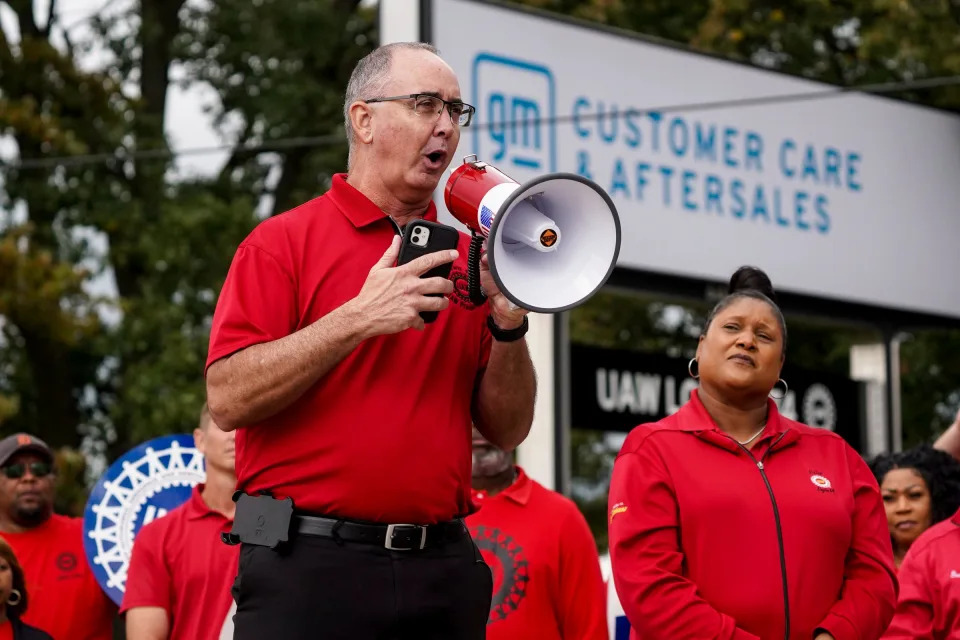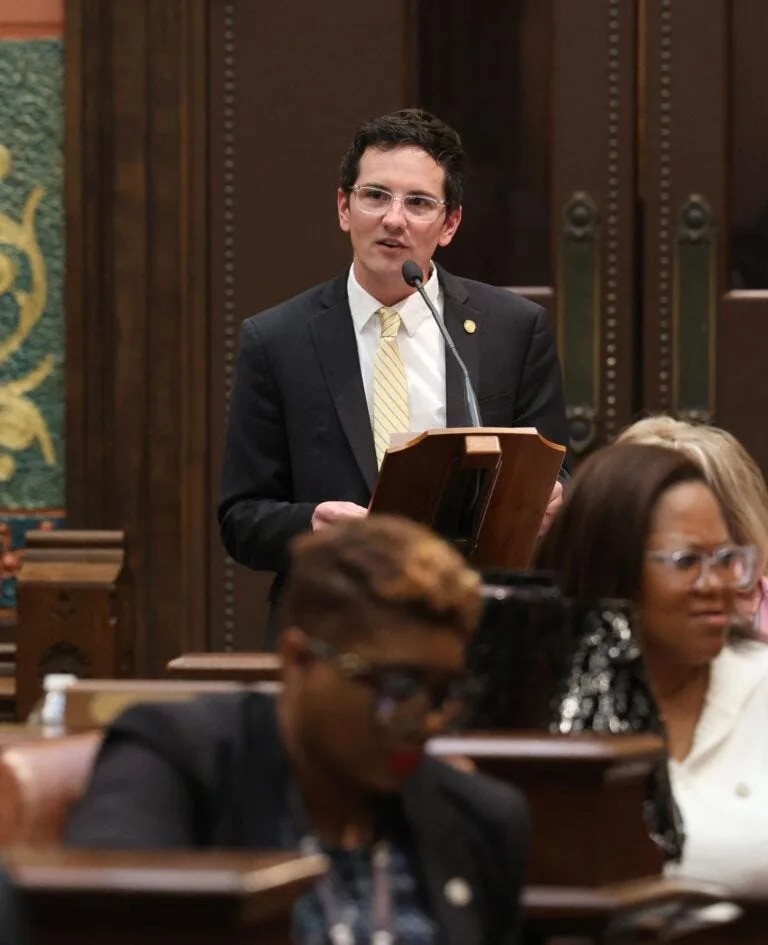Clara Hendrickson, Detroit Free Press
Mon, October 2, 2023
There's a number Michigan Democrats may not shout out when they hit the campaign trail in their quest to preserve their newfound legislative power: $4.1 billion.
That's the total spending on business subsidies they've approved so far this year, according to an analysis from the Mackinac Center for Public Policy, a self-described "free market" research organization. Many of those dollars were diverted to a state fund that has helped automakers transition to electric vehicle production.
For some, the money fits uncomfortably in Democrats' legacy in Michigan where the party holds a slim majority and has a chance to pursue policy ideas after 40 years relegated to the minority. Scrutiny of the spending has also made its way to the negotiating table. UAW President Shawn Fain has said that if the public helps foot the bill for auto companies transitioning to electric vehicles, workers should also benefit. "As it stands right now, the workers are being left behind," he said on CBS last month.

While some Democratic lawmakers have touted the spending, it puzzles others who see it as hard to square with the party's rhetoric of putting people over profits. The funds haven't flowed without controversy. It's spurred infighting among Michigan Democrats, according to a person familiar with internal discussions who didn't want to speak on the record due to the contentious nature of the conversations. Even as they approved large sums for corporations, some Democratic lawmakers vowed to re-evaluate the state's economic development approach.
"I don't think anyone would have guessed that money for Ford or whatever would have been the first thing that they tried to do," said former Democratic staffer MoReno Taylor II, now executive director for Fund MI Future, a coalition focused on securing funding for public services from roads to schools.

Private investments backed by public dollars are just one part of Democrats' economic agenda, House Speaker Joe Tate, D-Detroit, emphasized in an interview with the Free Press. Democrats have also delivered economic relief for Michiganders such as with a tax cut for retirees and low-income earners. Tate defended the big spending on corporate subsidies as key to maintaining Michigan's competitive edge in a changing auto industry and supporting Democrats' climate goals.
Gov. Gretchen Whitmer has championed electric vehicle plants in Michigan backed by state funds, a key pillar of her economic agenda. Michigan's economic development officials note that companies must follow through on their investment promises and create new jobs in order to receive any state funds. But to land those jobs, the state needs to move quickly, Whitmer has repeatedly said. She joins economic development officials and corporate executives to announce deals before lawmakers have a chance to vet or approve the state funds to support them.
While some Democratic lawmakers want to change this process, one freshman lawmaker wants Democrats to abandon their support for such deals wholesale. "I personally feel like it is a betrayal of the working class. I think it's a big mistake," said state Rep. Dylan Wegela, D-Garden City, of corporate subsidy spending approved by Democratic lawmakers this year. "We're not supposed to be the party that believes in trickle down economics."
A record for the decade, conflicting views
The last time lawmakers reached this session's level of business subsidy spending was in the 2007-2008 session when control of the Legislature was split and Democratic Gov. Jennifer Granholm was signing bills.
While Democrats have touted their investments in families, business subsidies approved so far this year amount to more than 25 times the amount lawmakers approved to fund free school meals for all public school children in the state, and it's almost twice as large as the higher education budget for public universities.
Democrats disagree on the scale and necessity of the spending.
State Rep. Angela Witwer, D-Delta Township, has celebrated the spending as a boon for state's economy. "Until there is a national call to stop doing this, why would we stop competing?" she said in a podcast interview with MIRS in May. Witwer did not respond to a request from the Free Press for an interview.
Other Democratic lawmakers have expressed tepid support for the spending while harboring questions about its return on investment and expressing reluctance to commit more funds.
"I've been okay with what we've spent so far but have had some concerns about the volume and would be hesitant to support future investments in this one priority," said state Rep. Jason Morgan, D-Ann Arbor.

Some see an opening for what they call a long overdue need to reevaluate Michigan’s willingness to hand over taxpayer dollars to large companies.
One deal in particular has raised eyebrows: a Ford battery plant set to receive about $1.8 billion in subsidies put on hold amid the UAW strike.
"The people of Michigan and our elected officials have done so much for this corporation over the course of their time," Taylor said before Ford's construction pause. "The fact that we have to beg and f***ing bribe them to just do business here and do business in a good way, it's f***ing insane. It's really sad." Taylor said it's time to reevaluate Michigan's approach to economic development.
Some Democrats say they're doing just that. While business subsidies mark a key part of their economic agenda since taking power, it’s also prompted a Democratic-led effort to scrutinize the state's approach to spur job creation by giving cash directly to companies.
Where Michigan's corporate subsidy dollars went
James Hohman, the director of fiscal policy for the Mackinac Center, doubts that the spending will create new jobs and suggested lawmakers should share his misgivings. "Our lawmakers should be a lot more skeptical of their ability to influence the state economies by writing big checks to big companies," he said.
Among this year's big-ticket business subsidies signed into law included in the Mackinac Center's analysis:
More than $1.8 billion for the Strategic Outreach and Attraction Reserve fund, which provides grants to companies that create new jobs and subsidizes their site preparation;
$800 million to lift the cap on the brownfield program, which reimburses costs associated with redeveloping contaminated, blighted or historic properties. It was part of a Democratic-led bill package that obtained bipartisan support to expand the brownfield program with the intent of increasing the supply of affordable housing;
$629.7 million for site readiness as well as road and infrastructure improvements at a Ford electric vehicle battery plant near Marshall;
$400 million for revitalization and placemaking grants which can be used for business subsidies, although some grants have gone to cities and non-profit groups in the past;
More than $286.8 million for the Make It In Michigan Fund to leverage federal funding opportunities, including in economic development;
$200 million to retain jobs at a paper mill near Escanaba;
$100 million in business attraction and community revitalization funds.
Just last session, bipartisan fanfare accompanied announcements for major economic development projects receiving state support. But now in the legislative minority, Republican leaders this session have railed against the spending.
"I'm not a crony capitalist," Senate Minority Leader Aric Nesbitt, R-Porter Township, said earlier this year when asked to explain his opposition to the spending.
Corporate subsidies attached to Whitmer tax promise
Committing taxpayer dollars to business subsidies became a key part of Whitmer's long-promised tax overhaul.
When Gov. Rick Snyder, a Republican, overhauled Michigan's tax system, Democrats − including Whitmer − railed against it as a business tax cut paid for on the backs of retirees and low-income workers. During Whitmer's first run for governor, she campaigned on reversing Republican tax hikes for seniors in Michigan and increasing a tax credit for working families.

Whitmer's first budget proposed restoring tax breaks for retirees by creating a new business tax for pass-through entities. Repeated attempts to repeal Snyder's so-called retirement tax went nowhere under GOP control.
New Democratic majorities in Lansing finally gave Whitmer her opening to make good on her campaign promise. But she didn't resurface her earlier proposal to expand the corporate income tax to more businesses in the state, citing the state's strong financial position at the start of this yea
Instead of touching the corporate income tax, the legislation she signed diverted up to $1.5 billion to subsidize companies looking to grow their business in Michigan.
Wegela was the lone Democratic lawmaker to vote against the legislation because of the business subsidy spending. The tax legislation was among the votes that caused a stir within the Democratic caucus, one source said.
While Wegela was the only Democrat to speak out against the spending at the time, behind closed doors, other Democrats expressed their displeasure over attaching the corporate subsidies to the tax overhaul.
A person familiar with the discussions described them as incredibly fraught. "I mean starting the year off with this, not ideal," the source said. "I mean it got really hot." In addition to the tax overhaul, votes on funding for the Ford electric vehicle battery plant near Marshall also prompted tough conversations within the caucus. "Those two were not pretty," the source said.

An opportunity cost in corporate subsidies?
In the spending, some see the opportunity cost that comes with decisions to spend taxpayers’ dollars on business subsidies versus any number of public needs.
State Rep. Joey Andrews, D-St. Joseph, said it's hard not to look at the money lawmakers approved for business attraction projects and not see funding for mental health and roads.
"I mean even with the size that the budget was, there was stuff that got left on the cutting room floor," he said. "There's certainly things that I think a lot of us wish we could have done more on."
In the spending, some see the opportunity cost that comes with decisions to spend taxpayers’ dollars on business subsidies versus any number of public needs.
State Rep. Joey Andrews, D-St. Joseph, said it's hard not to look at the money lawmakers approved for business attraction projects and not see funding for mental health and roads.
"I mean even with the size that the budget was, there was stuff that got left on the cutting room floor," he said. "There's certainly things that I think a lot of us wish we could have done more on."

Morgan – another a freshman Democratic lawmaker – said there are multi-billion dollar needs in housing, infrastructure and education that lawmakers should prioritize moving forward.
Michigan entered the year with an estimated $9 billion surplus largely driven by a one-time influx of federal dollars. Without a similar sum in the state's coffers next year, lawmakers face more limits on how to spend taxpayer dollars and which funding needs to prioritize.
While another budget cycle might prompt some tough calls on spending priorities, some see an ongoing reckoning within the party as it wrestles with its changing base and the shift in party platforms that follow.
Andrews said that since Donald Trump's election in 2016, the two major parties have realigned economically, with well-off suburban communities where Republicans used to dominate turning bluer while Democrats' strength in blue-collar communities faded.
"I think with that realignment of the electorate also comes some realignments in values," he said. "So I think something that's concerned me is seeing the Democratic Party kind of very slowly over the last six years become a little more corporate, a little more ok with this sort of thing."
Contact Clara Hendrickson at chendrickson@freepress.com
Follow her on X, previously called Twitter, @clarajanehen
This article originally appeared on Detroit Free Press: Michigan Democrats wrestle with corporate spending legacy
This article originally appeared on Detroit Free Press: Michigan Democrats wrestle with corporate spending legacy
No comments:
Post a Comment